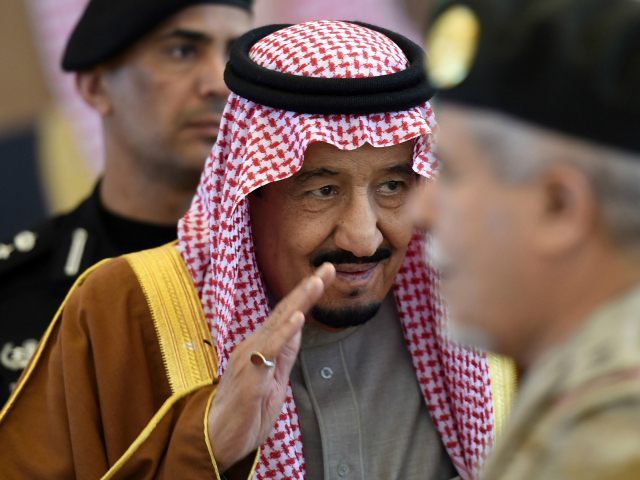Contrary to much speculation, Saudi officials stated on Sunday that King Salman bin Abdulaziz has no intention of abdicating to pass the throne along to his son, Crown Prince Mohammed bin Salman.
“There is no possibility whatsoever that the king will abdicate,” an official stated, adding that rumors of abdication have been spread by people who “do not understand royal customs and traditions in Saudi Arabia.”
The official insisted that King Salman, who is 81 years old, retains “perfect” physical health and mental acuity.
Bloomberg Politics reports that speculation of abdication went chugging right along despite this statement, with analyst Graham Griffiths pointing out that a living king’s voluntary retirement is something “no one expects them to acknowledge as a possibility before it happens.”
Also, it did happen once before, when King Saud abdicated in favor of his brother Prince Faisal in 1962. That was more of a soft coup than an abdication, but it occurred at a time of crisis similar in some ways to the upheaval sweeping Saudi Arabia today.
The difference, in this case, would be King Salman’s voluntarily handing over the throne to his crown prince because he approves of Mohammed bin Salman’s reform agenda, whereas King Saud was invited to consider the joys of early retirement in Switzerland after strenuously opposing Prince Faisal’s reform agenda. Griffiths suggested that MBS, as he is widely known, might become more interested in an early ascension to the throne if the royal family challenges his domestic initiatives and threatens his authority.
It is difficult to measure popular opinion in Saudi Arabia during fast-moving events or to estimate just how much weight popular opinion carries with the monarchy, but the king and crown prince might be able to persuade recalcitrant royals to go along with their agenda by claiming popular support.
The New York Times wonders just how much popular support there might be for Salman’s vision of “moderate Islam” in a nation largely educated by the hardline Wahhabi school. It is anyone’s guess how a public already nervous about a souring economy will react if the current instability rocks Saudi corporate ventures, scares off international investors, and costs jobs. A significant heating of the cold war with Iran and its proxies might be in the cards as well.
Business Insider judges that Salman already has more power than any crown prince in Saudi Arabia’s history, so he would seem to have little need for a rush to the throne – except that he might have gone too far with his anti-corruption purge by removing Prince Mutaib bin Abdullah from his post as commander of the Saudi National Guard, the country’s best fighting force and a vital cultural link between the royal family and tribal leaders.
“The National Guard has largely been spared deployment to Saudi Arabia’s dangerous and porous border with Yemen. This is largely due to Prince Mutaib bin Abdullah’s efforts to thwart MbS’ war in Yemen, which is regarded by many within the House of Saud as reckless, dangerous, and deeply immoral,” Business Insider explains, anticipating that the backlash from tribal leaders, Prince Mutaib bin Abdullah’s supporters, and Saudis unhappy with the Yemen war could be more than MBS bargained for.
On the other hand, more optimistic analysts note that if the crown prince’s ambitious reform agenda pays off as planned, the result would be long-term stability, better international economic relations, and reduced corruption that would undoubtedly please most of the Saudi public. For the moment, squashing rumors of abdication is the best way for the king to show confidence in his designated successor and send a signal that the Saudi system is holding together despite the current turbulence.

COMMENTS
Please let us know if you're having issues with commenting.